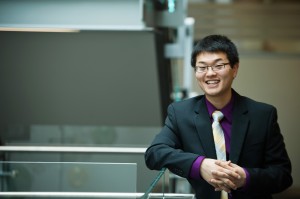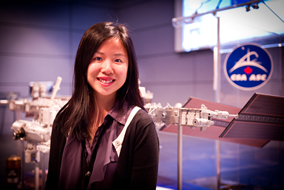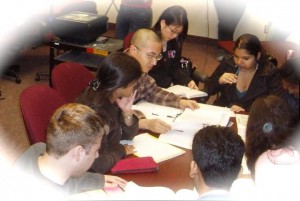
I get to welcome our entering classes each year at “Meet the Dean” on Imagine Day. This year our entering class was so large that we used up all the seats in the Chan Centre for both ceremonies and had to seat hundreds of students on the stage!
Introduction: Making your own history
We begin all official ceremonies at UBC with this short declaration:
“UBC is located on the traditional, ancestral and un-ceded territory of the Musqueam people.” The Musqueam are a Salish First Nations people who remain our neighbours, and so we take advantage of these moments to recognize our debt and our close relationship – I hope that during your time at UBC you’ll have the opportunity take advantage of their hospitality to learn some things about First Nations cultures or languages, perhaps in the new Institute of Critical Indigenous Studies, or you could start just down the street at MOA, a museum of aboriginal and global arts and culture that is one of UBC’s – and Vancouver’s – leading attractions.
But first, let me welcome you to UBC, and welcome to its largest and most diverse faculty, the Faculty of Arts. It’s an auspicious year to be joining UBC. It’s our 100th birthday, and all year long we will be celebrating the incredible achievements of the last century, and envisioning the possibilities for the next 100 years. We’re 100 years old but still growing strong.
This is where you come in. You are creating the next part of our history as well as your own— you are the first entering class of the next hundred years!! We invited you to join UBC’s Faculty of Arts because we believe you have what it takes to succeed, grow and flourish here. We expect that each of you will make a great contribution to our remarkable community.
I was reminded just last night about the contributions our students are making in the world. My daughter, my niece and I were out kayaking, trying to squeeze in one more bit of summer enjoyment, and afterwards we stopped in to our neighborhood convenience store. The owner, whose son graduated just last spring from UBC in Arts, asked me about the start of school. In turn, I asked her about how her son was doing.
It turns out that he went to Europe to teach English in Spain—I remember him telling me this on stage as he graduated—but as he was travelling in Serbia, the Syrian refugee crisis began to peak. He found himself volunteering in Belgrade, providing food and clothing to this massive movement of people through Europe fleeing conflict zones and overpopulated refugee camps. Apparently he is heading soon to Budapest in Hungary to continue in his volunteer role before starting his job. His mom is very proud of him—as am I. You may not all find yourselves helping in the middle of a global crisis, as he has, but you should find yourself with new skills and a new worldview, ready to engage with the world.
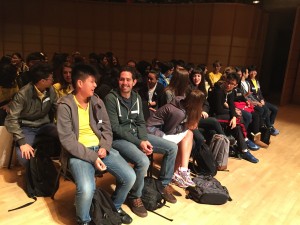
Let’s get acquainted
If you’re feeling overwhelmed, you’re not alone. Clever tweets, Facebook and Instagram posts aside, I can assure you that virtually everyone here is at least little nervous — myself included. I’m a bit shy by nature and it’s not easy to talk to 2,000 students at once on stage at the beautiful Chan Centre.
So let’s break the ice. In a minute I’m going to ask you to turn to someone to your right, or left or behind you — someone you don’t know — and introduce yourself. Tell them something about you… maybe your current Netflix binge-watching obsession, your pet’s name, something about your family, or your 10-second take on the meaning of life.
I know it can be uncomfortable to talk to a total stranger, but Arts UBC is a place where we take risks and stretch out of our comfort zones, so let’s start today. I’ll get the ball rolling. Here’s some things few people outside my family know about me (except you, now): I cut my own hair. My favorite song: probably “Psycho Killer” by the Talking Heads (before your time), and when I was a very little boy my father called me “A walking compendium of useless facts and trivial knowledge”, anticipating, I think, that I would someday be a professor.
Okay, now it’s your turn. Find a neighbor or two, introduce yourself and tell them something about you. Great—that was the easy part of my talk – I didn’t have to do anything! Now that we all have someone we can say hi to, let’s get down to why you’re here.
Making a difference
Show of hands — how many of you know what you want to do with your life? My guess is that even if you do know, you may have no idea what that actually looks like, or how you’re going to get there. That’s okay. Actually, that’s fantastic, because it means that you have the flexibility to grow and change along with your interests and the rapidly changing world around us. Most of us don’t have a long-term vision of what we want our lives to look like or a plan to get there.
I still ask myself what I’m going to do when I grow up. I started out in Forestry, before dropping out of university to become a community organizer, and then radio deejay, festival organizer, musician, and tractor driver. Eventually, I went back to school and found my passion for ethnomusicology, the study of the world’s music in its cultural and social context. When I discovered ethnomusicology, I knew I had found something that I could do for the rest of my life and not get bored.
Whether you have a plan, or are open to taking a circuitous route like I did, one thing most of us do know is that we want to be relevant, we want to make an impact on the world, make a difference and make our lives count, and we also want to enjoy what we’re doing. Asking yourself through your university years how you can build on your passions and interest to make a difference will help you to fashion the path ahead for yourself. Your Arts UBC degree will ground you in new ways of thinking. It will give you the latitude to explore your interests and to sharpen your focus. It will power your life and career.
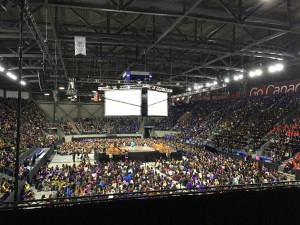
Exploring your interests and passions: toward a personalized education
An Arts education is a powerful tool in your arsenal as you consider your future career and lifetime of learning. We don’t know which specialized skills will be in demand in the future. But we do know that as technology and economies change rapidly, general intellectual and analytic skills are at a premium.
Here at Arts UBC we are not training you for your first job—or even for a job that exists now! — but rather giving you the skills you’ll need to be prepared for a lifetime of successful transitions and new challenges.
An Arts UBC education will heighten your cultural sensitivity, carry out research, organize your thoughts and communicate them clearly, effectively and persuasively. Whether you go onto graduate school, a professional program like Law or Business, or seek employment after graduation, an Arts education is the edge that will position you broadly and allow you to make a real contribution to your community.
The diversity of Arts is an advantage: it will allow you to create your own personalized program to emerge from the university life-ready and world-ready. There are countless options to choose from. We are home to four institutes, five schools, 16 departments, 750 faculty and thousands of courses. You can choose majors and minors from dozens of options in social sciences, creative and performing arts, humanities, interdisciplinary programs and more—and you are encouraged to take courses in other faculties. From this extensive and diverse platform, the opportunities for a unique educational journey are literally innumerable.
Let’s say you’re interested in helping communities preserve and make sense of their cultural resources – you might consider combining studies in History, Anthropology and some Computer Science courses. A degree that combines Political Science with Religious Studies will prepare you to understand regional and international conflicts. Putting together Economics and Asian Studies, you could contribute expert perspectives on trade and globalization. Seriously, the possibilities are endless. The secret is to take control of your education.
I’m not trying to scare you. My goal is to excite you about the possibilities the next few years hold and your chance to design and chart your own course. This path most likely won’t be a straight line, but I promise you that it will lead to a deeper understanding of yourself and the world around you.
You are making a huge investment in time and resources to be here, so by all means take some time to stretch yourself and explore your interests – our programs let you do that. These are the years where you begin to write your own unique story. If you are intentional, if you actively take a leadership role in your education, if you pay attention to your interests and take advantage of the unique power of an Arts education, opportunities will unfold.
You have four years in front of you to learn about what you’re interested in, leverage your talents, explore your ambitions, develop priorities and set goals. You have the privilege to do so alongside some of the very best minds out there — not just your professors and TAs but the students all around you today. We’ll do our best to create a safe, supportive environment where you can take academic risks. I challenge you to do so, and to have the courage to get back up when you fail.
Arts and employment
Employers want to hire people who know how to communicate, who have the ability to solve problems, and embrace teamwork. One third of Fortune 500 CEOs have Arts degrees. A recent survey on employer priorities showed that not only do employers recognize the Power of Arts, but wish more university graduates had the unique toolkit that an Arts education provides. In that survey, 82 percent of employers wanted universities to do exactly what we do here at Arts UBC — place more emphasis on teaching how to learn, including analytical reasoning skills. In addition, 80 percent wanted more emphasis on written and oral communication skills, and 91 percent wanted to see more emphasis on problem solving in diverse settings. This is not just abstract talk. There are more and more global business leaders pointing to the benefits of an Arts education.
Tony Golsby-Smith, founder and CEO of Second Road, an Australian strategic planning firm, noted in Harvard Business Review that if corporations want innovative thinking, they should hire Arts graduates because they are experts at answering “What if” questions, and because, in his words,
“People trained in the humanities who study Shakespeare’s poetry, or Cezanne’s paintings, have learned to play with big concepts, and to apply new ways of thinking to difficult problems that can’t be analyzed in
Wrap-up: Making the most of your time at UBC
Make the most of everything UBC has to offer. This is a truly unique and formative time of your lives. Believe me, it goes by quickly, so soak it up. On the academic side, exploit opportunities to apply what you’re learning in the classroom out into the world. Not only will this help you to retain information, but it will also give you the opportunity to make sense of it in real-life situations.
You’ll find that many of our programs put an emphasis on experiential learning. We offer Community Service Learning Courses where you can explore and contribute to our local communities. If you want to go further afield, Go Global exchanges can take your education around the world. You might also consider applying to the Arts co-op program where you can integrate work experience into your degree.
Of course, it’s not all learning all the time. Make sure to take the time to develop a social life — make new friends, join clubs, explore the Arts and Culture Quarter and everything it has to offer, from music to theatre to outdoor feasts (come to concerts in this great concert hall!).
And please — if you find yourself struggling, first, be kind to yourself. Next, ask for help. The Arts faculty and staff and most importantly our student advisors are here for you. We truly care about your wellbeing, and we are deeply invested in preparing you for your future. I encourage you to talk to an Arts Advisor — it’s a great place to start.
I’ve touched on just some of the many things this amazing, 100-year-old institution has to offer you as you lay the foundation for creating a rewarding and relevant life and career that will be powered by Arts. I wish each and every one of you the best for the coming year. Thanks for listening. I hope to see you later at the pep rally.
